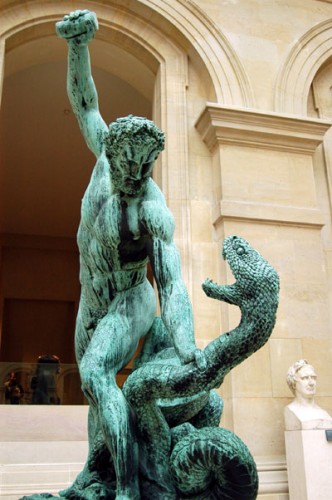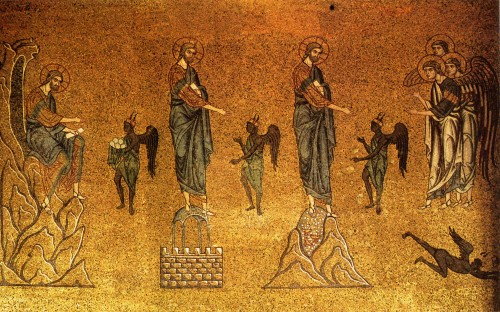
I was a bit surprised, reading Bulfinch’s Mythology yesterday, to discover an interesting ‘allegorizing’ move in the Greek myth of a river-god, Achelous, losing his horn. Hercules and Achelous, the story goes, were wrestling for the right to wed Dejanira, a beautiful woman. Achelous transforms into various creatures, including a snake, in his attempt to best Hercules, and Hercules subdues them all. Finally, Achelous transforms into his last remaining form, a bull, and Hercules rips off one of his horns, which becomes ‘Cornucopia’, the horn of plenty. Then things get interesting – as Bulfinch notes,
The ancients were fond of finding a hidden meaning in their mythological tales. They explain the fight of Achelous with Hercules by saying Achelous was a river that in seasons of rain overflowed its banks. When the fable says that Achelous loved Dejanira, and sought a union with her, the meaning is that the river in its windings flowed through part of Dejanira’s kingdom. It was said to take the form of snake because of its winding, and of a bull because it made a brawling or roaring in its course. When the river swelled, it made itself another channel. Thus its head was horned. Hercules prevented the return of these periodical overflows by embankments and canals; and therefore he was said to have vanquished the river-god and cut off his horn. Finally, the lands formerly subject to overflow, but now redeemed, became very fertile, and this is meant by the horn of plenty.
 It would seem like such a naturalistic explanation renders the story a rather dispensable fable, and we do tend to read texts (especially, though by no means exclusively, in the Christian world) as things with meanings that compete with one another, exclude one another. A friend of mine who used to teach ancient history to middle-schoolers gave lessons cleverly organized by following the thread of the Israelites: their stories, their varying political fortunes, and their ever-evolving – though remarkably continuous – sense of identity as a people. As he was explaining, one day, how Jewish monotheism emerged as a result of assimilation pressures, competition, and the need to distinguish themselves from those around them, the kids became divided between the intellectually exuberant and the personally offended. Because if historical pressures led to Jewish monotheism, then clearly it lacked a proper religious foundation. God was an invention, a Durkheimian something-or-another with no existence beyond human confabulation.
It would seem like such a naturalistic explanation renders the story a rather dispensable fable, and we do tend to read texts (especially, though by no means exclusively, in the Christian world) as things with meanings that compete with one another, exclude one another. A friend of mine who used to teach ancient history to middle-schoolers gave lessons cleverly organized by following the thread of the Israelites: their stories, their varying political fortunes, and their ever-evolving – though remarkably continuous – sense of identity as a people. As he was explaining, one day, how Jewish monotheism emerged as a result of assimilation pressures, competition, and the need to distinguish themselves from those around them, the kids became divided between the intellectually exuberant and the personally offended. Because if historical pressures led to Jewish monotheism, then clearly it lacked a proper religious foundation. God was an invention, a Durkheimian something-or-another with no existence beyond human confabulation.
Historians of ideas – Taylors and Milbanks and those who (rightfully) admire them – will speak of the unjustified replacement of such-and-such metaphysics with modern assumptions, trace the flattening-out of interpretation; theologians, like de Lubac and (recently) the very worthwhile Hans Boersma, will argue for a recovery of multiple meanings, claiming interpretations can be fully valid without such fullness rendering them exhaustive or exclusive. To see that the Greeks, with their cornucopia story, might have intended both explanations to be valid, one only needs to read the biblical commentaries of Origen or Leo, shockingly speculative, or meditate on Augustine’s principle that any biblical interpretation may be tolerated if it leads to the upbuilding of the Church. All of this is true, but in advocating a return to multiple meanings, we perhaps miss the leanings of the human heart.
Exclusivity of meaning presents the reader with two advantages: first, that we ‘get’ the passage with one right meaning, and there’s no need to continue. Some historians of ideas would point out that we’ve become accustomed to the easily-deployable, hard-and-reliable facts of science, and thus we tend to expect such exclusive, mathematical knowledge in various other fields. But perhaps we haven’t started to think this way merely on account of Descartes and Spinoza and Kant and all the other usual suspects, as if some wayward contingency in the development of ideas. More likely, such knowledge innately appeals to us by giving us mastery, dominion, and control.
Second, and related, exclusivity of meaning allows us to place others in the wrong, and ourselves in the right. In almost any demarcation we draw, it’s only natural to see ourselves in the right: hence our love of demarcations, often rather strange ones: are you a bicovenantalist, an infralapsarianist, or an amillennialist? All important questions within their frameworks, but the frameworks tend to be totalizing and a bit, well, weird. And sometimes our demarcations force us into utterly untenable positions: did the Apostle Paul write 1 Timothy, or is it a fraud? We need to know, and whatever frameworks we have, we tend to use to box things in.
The logic of grace opposes this view, in some sense, assaults it. We who have calcified our thinking in neat boxes become almost impervious to anything new: many critics who might’ve otherwise loved HBO’s True Detective, for example, couldn’t see past the ratio of lead males to lead females to derive anything else from the story. Some Christians had no lens for Aronofsky’s Noah beyond its adherence or lack thereof to a strictly construed biblical account. In Game of Thrones‘s second season, I was so horrified by the butchery of the books’ Jon Snow plot that I missed out on a brilliantly filmed, acted, and written series. I had my pride; I was expert on account of the books, and having my old expectations and opinions confirmed had so consumed me that anything new seemed hostile.
We all do this every day, with web articles and people and sightseeing and, God knows, religion. Moving back to Hercules and the bull, a story in which the river-god was nothing more than a clever way of talking about the river would seem pointless (why not tell it straight?), and a story drawn from a mythical history which could not be put in dialogue with the present,real world would seem equally dead, forgettable. Whatever paradigms we have will, regardless of our place in the history of thought or our ‘social imaginary’ or whatever else, tend to become rigid and stultified; we will take epistemic sovereignty over our world at the price of shrinking its horizons any day.
The old story, not the oldest but close, is one of human accomplishment producing favor from others and happiness for ourselves. It’s a story of reaching high with grasping hand to be like God, a story of restlessness needing to fasten onto ambition. The counter-story, that of Christianity, tells of a free gift of salvation, but we confine it by reciprocating, retroactively turning gift into wages-in-advance. All our reductive, exclusive, and purportedly exhaustive narratives reprise this theme: it’s almost impossible to thematize something outside the self without turning the window into a mirror, and falling in love – transfixed – with the reflection.
What breaks through this closed circle? A fundamental exclusivity occurs when we find God’s presence in good, thus assume it cannot be in bad; in achievement, and thus assume it cannot be in failure; in wisdom, and thus assume it cannot be in what seems reckless or foolish. Against this story, a counter-thread runs throughout the Bible: Moses, killer and stammerer, speaks against Pharaoh; David, not fit for kingship in his own father’s eyes, becomes Israel’s greatest king; Jesus, born with dirty animals out of wedlock, becomes a great teacher. This thread lurks beneath the surface as Palm Sunday fuels the narrow, exclusive human story: he sits on a donkey, bows his head, lowers his eyes, but no one takes notice of these ominous signs; their minds shut out these witnesses to weakness, or perhaps they never notice. On the cross, they cannot help but notice, and they mock and jeer.
Gerhard Forde: “Since we are inveterate theologians of glory, God cannot come appealing to our religious aspirations. Therefore God’s work can only take place under the form of opposites, sub contrario. God does his alien and wrathful work before he does his proper and loving work; he makes alive by killing, brings to heaven by going through hell, brings forth mercy out of wrath.”
In narrative terms, God brings out the ‘wrong’ side of the story, the foolish parts, to shame the wise. How this breaks through the closed circle of our theologies of glory becomes a model for the breaking, not of our impulse toward control, but first of the illusion we possess it. Christianity shares with any good writing, but on a more fundamental level, the task of bringing weakness and foolishness to light. Multiple meanings, openness to new interpretations, and embracing truth’s infinitude (at the cost of our ability to encompass it) are not only justified in Christianity; they are required by it.
Human language must inevitably be turned to the ends of control, and even the word ‘required’ puts us back in the story of doing, accomplishing, and the like. And openness, or humility, or the like cannot be achieved by effort; the effort itself intrinsically fortifies our roadblock, which is the Old Adam’s story. But as for the bystanders on Palm Sunday, for us too that story is eventually shattered, usually by some personal impasse. When something doesn’t work as planned, doesn’t add up; when things go differently than we’d hoped or we see traits in ourselves we never wished to, that too, counterintuitively, can work as the Spirit brushing aside the pieces of our tiny room of mirrors, giving a glimpse beyond.
People sometimes pray for God to send suffering their way and humble them: this wrests the cross back into the glory narrative, “the minor fall and the major lift”, as if it were a technique rather than a judgment on all human techniques, one which saves us from reliance upon them. The how will thus always be mysterious, elusive, and frequently unpleasant, but the what of this context is certain:
“A new heart I will give you, and a new spirit I will put within you; and I will remove from your body the heart of stone and give you a heart of flesh.”

COMMENTS
2 responses to “The Logic of Grace and the Exclusivity of Meaning”
Leave a Reply















Love this, Will. Really great stuff.
Will: One of the most important pieces that I’ve read in a while. Watch “Kung Fu
Hustle,” and you see Zahl’s three tenets of Christianity: Free will? not; Grace trumps
Law; and Strength in Weakness. These principles are at work in the world, and they
are recognized by non- Christians. Truth about how the world works isn’t exclusive
to Christianity.
My preacher at Cov Pres recently said, from the pulpit, and I’m paraphrasing: If you
think you have Jesus figured, you’ve been worshipping the wrong god.
Wonderful piece Will!
Best, Ellis.